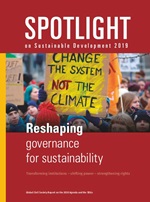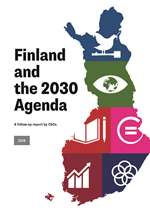Published on Fri, 2020-02-07 08:23
Social protection, when properly designed, effectively prevents and reduces poverty and inequality highlight Sylvia Beales and Nicola Wiebe (Global Coalition for Social Protection Floors) in the Spotlight report. Guaranteed social protection supports improved nutrition and access to essential services and can therefore interrupt the vicious cycle of poverty and its intergenerational transfer. Universal access rights to social protection means that those at extreme disadvantage can be reached, which contributes to overcoming deeply rooted experiences of discrimination and exclusion, disempowerment and gender inequality. But currently only 29 percent of the global population count on comprehensive social protection over the lifecourse and for the different contingencies that may occur. Fewer than 16 percent of older people in low-income countries have a pension, with older women less likely than older men to receive one. |
Published on Tue, 2020-02-04 22:27
Arab NGO Network for Development (ANND) issues a statement on the ‘Deal of the Century’ and recalls that an immediate end to Israeli occupation and the recognition of the universal, indivisible and inalienable Palestinian Rights are the foundations of a sustainable Peace in the Middle East. On January 28th, 2020 the Middle East Peace Plan known as the Deal of the Century was presented by the US President Donald Trump in Washington DC. A “peace” plan that was built unilaterally and that considers the Israeli occupation as the exclusive partner. The “peace” plan markets an illusion of peace at the expense of Palestinian people’s rights and dignity. It gives further impunity to all human rights violations committed by the Israeli occupation, including through legalizing illegal Israeli settlements. |
Published on Thu, 2020-01-30 10:23
In Finland, the civil society report of Fingo, the association of Finnish development NGOs, concludes that “conflicts of interest between actors lead to decisions where a short-term economic advantage eclipses long-term sustainability.” Finland claims to be “among the first to draft a national implementation plan, to initiate sustainable development budgeting, to establish an inclusive monitoring system and a citizens’ panel, and commission an external evaluation of the world's first national 2030 Agenda policy, the PATH2030 report published in March 2019”. Yet, the alternative report shows that Finland is not consistently committed to the human rights-based approach of the 2030 Agenda, to ensure that “no one is left behind”. Further, “the 2030 Agenda is widely known about in Finland, but there is no consistent understanding of its interpretation and political significance”. |
Published on Thu, 2020-01-30 10:08
In India the official VNR's main point is that rapid economic growth has sharply reduced poverty. A 2018 study backs this claim saying extreme poverty is declining in India at rate of 44 people per minute as a result of which, since May 2018, India claims to no longer have the largest number of poor people. Despite this dramatic poverty reduction, over 73 million Indians still live below the international poverty line. Most of these people subsisting on less than US$1.90 a day are in rural areas. Even as the absolute numbers of poor fall there is rapid rise in inequality. A 2018 Oxfam report says India’s richest one percent garnered 73 percent of national wealth generated in 2017. |
Published on Wed, 2020-01-29 21:51
“The Data Revolution” has been promoted as a vital tool to help to achieve the SDGs or, at least, to better measure progress. Having access to massive amounts of data is seen as helpful for countries to plan, design and implement development and public policies in general. This chapter highlights concerns about this revolution and suggests how to rethink global governance for the digital era. The redefinition of the principles, norms and policies (software) and the structures and institutions (hardware) of sustainable development governance is closely related to our capacity to adopt new rules and adapt international structures to govern data and Artificial Intelligence (AI) and their impact on our lives and rights. |
SUSCRIBE TO OUR NEWSLETTER






